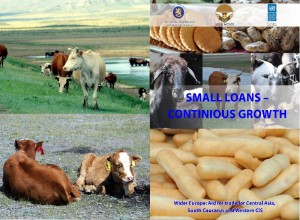 SEMEY – The UN Development Programme’s Wider Europe: Aid for Trade project seeks to help villages in Central Asia, the South Caucasus and the western countries of the Commonwealth of Independent States develop business. The project was launched in East Kazakhstan in 2009 with the financial support of the Foreign Ministry of Finland.
SEMEY – The UN Development Programme’s Wider Europe: Aid for Trade project seeks to help villages in Central Asia, the South Caucasus and the western countries of the Commonwealth of Independent States develop business. The project was launched in East Kazakhstan in 2009 with the financial support of the Foreign Ministry of Finland.
In choosing the territory to promote the project, organisers took into account East Kazakhstan’s unique identity as a centuries-old trade crossroads. The Silk Road connecting China and Europe passed through the territory, bringing with it some of the world’s first attempts at doing business.
Today, East Kazakhstan has a population of 1.3 million and more than 10,000 enterprises. Unfortunately, not all aspiring entrepreneurs have access to financing or information about the rules of doing business, which greatly hinders the development of business, especially in rural areas.
A number of government programmes are attempting to change that situation. The Aid for Trade project has also made a contribution. Through this programme, dozens of villagers have started their own businesses using loans provided by the Bereke microcredit organisation, which works with the support of the UNDP. In selecting projects, Bereke acts in the interest of borrowers and has supported projects that have paid for the reconstruction of distant pasture facilities or purchased livestock or production equipment.
Sarzhal Village is located near the former Semipalatinsk nuclear test site. The area sees no heavy snowfall and cattle can graze all year round, which greatly helps local farmers. But the area’s weather is unpredictable and in 2010, severe frost and heavy snowfall killed almost half of the region’s agricultural livestock. Locals didn’t have time to deliver feed and hay to their farms.
Head of a local farm Nurzhan Aukashev suffered losses and decided to apply to the microcredit organisation to get back on his feet. With financial assistance, Aukashev, who mostly produces horses for making kumis (fermented horse milk) bought 150 animals and a tractor to harvest fodder. Aukashev manufactures kumis year round, milking 13 mares in the winter and 60 in the summer. Aukashev receives orders from the neighbourhood and also sells kumis in bulk in Semey.
Zhanargul Duissenova is now the owner of a small farm and a grocery store in Karaul Village, also located not far from the former test site. Her family lived hand to mouth until she decided to start her own business. With the two million tenge (US$12,985) she borrowed from Bereke, Duissenova bought Kazakh White Head cattle and has increased her sales of meat and dairy products significantly. Today her family has about 300 animals and plans to build more paddocks.
Like many other villagers, Duissenova attended training workshops organised by the UNDP that focused on credit, taxation, sales promotion and legality issues in doing business. The organisers of the workshops often invited successful entrepreneurs from the East Kazakhstan oblast involved in the Wider Europe: Aid for Trade project as trainers. The workshops also attracted the owners of stable businesses who were interested in pursuing growth.
Irina Darmina, one seminar participant, now plans to open a sewing shop in addition to running a department store.
Mukhtar Toregeldy from Kalbatau Village in the Zharmin district received a loan for the development and expansion of his business this year. Toregeldy has a farming partnership, a food store and a mini-bakery. He grows 60 hectares of soybeans and plans to start processing them. To do this, he took a loan from Bereke to purchase the necessary equipment.
So far, all entrepreneurs who have taken loans have repaid them, and Bereke is continuing to support farmers in the region using the returned funds.
This year, the trade facilitation project has implemented a grant programme aimed at supporting inclusive and innovative business ideas in rural populations. Information stops, waste paper recycling facilities and automated service stations are among the proposals that have been suggested.
Young businessman Nasypkan Samgau from Shygys Village also received grant assistance through the UNDP project. His business idea, worth 1.5 million tenge (about US$9,740), is to open a modern plant for producing leather shoes using automated small-operation technology to increase the quality and quantity of production. Samgau hopes that in two years he will be able to double his production volumes.
The young innovator also received help from the Youth Entrepreneurship Development Fund, a consulting partner of the UNDP with an extensive network of consultants. Today, its online centres, established in 32 settlements, provide consulting services, in addition to other useful information and free Internet access for socially vulnerable populations.

